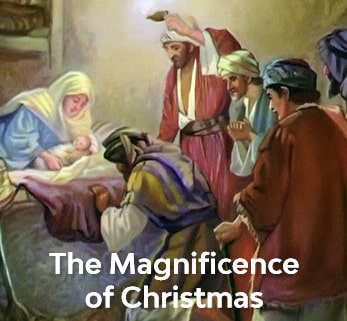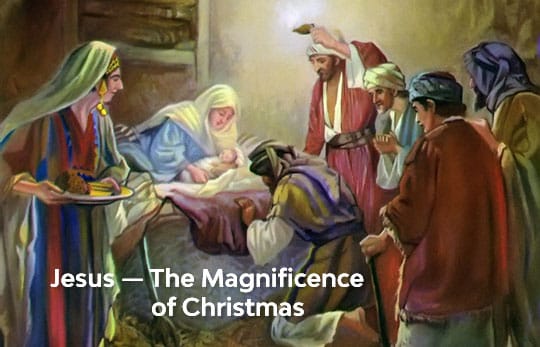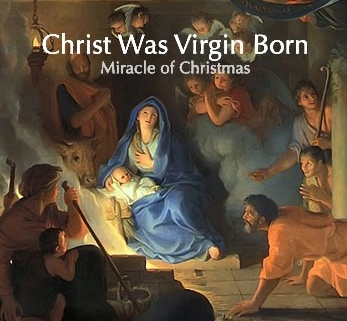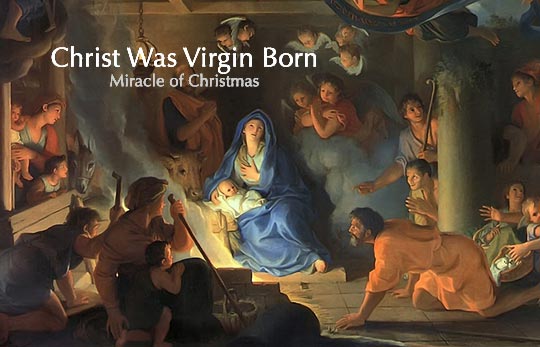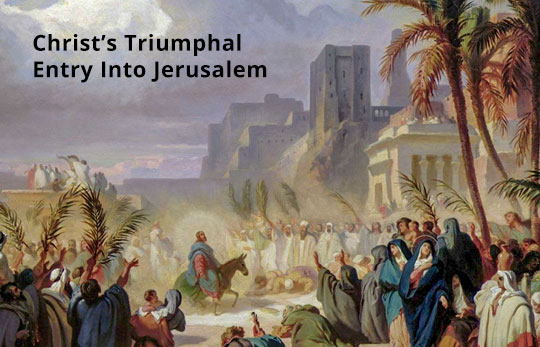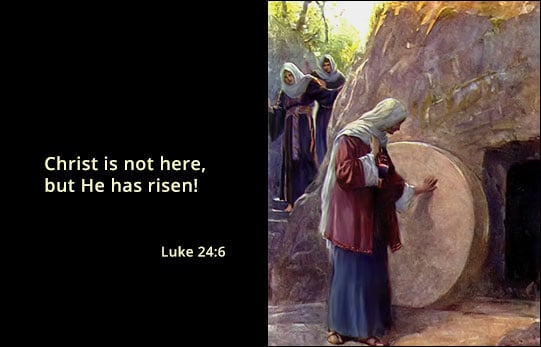The Magi of Christmas

In our last study, we relived the events that surrounded the days before and after Jesus’ birth. We relived the struggle of the poor family—that is, Joseph and Mary—as they took Jesus up from Nazareth to Jerusalem. We relived the joy of the shepherds when an angel announced to them that Jesus was born, He was their Savior and Christ the Lord. We relived all of the events that surrounded what we refer to as Christmas Day.
Only Shepherds Visited Jesus On Christmas
I was impressed with this passage as I thought about the fact that the shepherds had visited Jesus while He was still in the manger. I was impressed by the fact that no one else apparently visited Jesus—at least it is not recorded. I can imagine there were people from nearby homes who did not visit Him. Remember that the shepherds went from place to place in search of Jesus. Surely there had to be some people who were interested in finding where He was and who He really was. Yet Scripture does not tell us. Scripture only tells us that some shepherds had visited Jesus and then told everybody as they left.
Prophet and Prophetess See Jesus
The next thing we discover in the gospel of Luke is that eight days later Jesus was taken up to Jerusalem to be dedicated. At the same time, He was also circumcised. We are told in Luke 2:25-38 that Simeon and Anna blessed Jesus. Simeon was a righteous and just man, and Anna was a prophetess. They had some wonderful things to say about Jesus.
Then Joseph, Mary, and Jesus returned to Bethlehem. But they did not go back to the inn, they moved into a house. Matthew 2 is the continuation of the biography of Jesus. It is obviously not an autobiography, because someone else is writing it. It is the “headline news,” if you please. I was thinking about our television programs and how some are simply headline news. That is what the Gospels are. The Gospels are headline news. They do not try to tell us everything and all the details. They only catch the headline news about Jesus, about what He did during His ministry.
Magi Arrive From the East
When we come to Matthew 2, we are given a summary of Luke’s account initially. Here is verse 1,
Now after Jesus was born in Bethlehem of Judea in the days of Herod the king, magi from the East arrived in Jerusalem, saying . . . Matthew 2:1 (NASB)
Now if you look at verse 1, you will find seven little, but important words. They are “Jesus was born in Bethlehem of Judea.” That is a summary of what Luke described in Luke 2. The gospel of Luke took about seven verses to describe the birth of Jesus Christ, or twenty verses, if we include the shepherds. Matthew summarizes Luke 2:1-20 in seven simple words: “Jesus was born in Bethlehem of Judea.” It is very interesting how much attention Matthew gives to the events of Christmas. Matthew 2:1 skips two years right in the middle of verse one. Scripture does that. Scripture will all of a sudden skip a large period of time between verses, and even within verses. This is a great example. We are told,
Now after Jesus was born in Bethlehem of Judea …
Now here we go. Two years later . . .
… in the days of Herod the king, magi from the East arrived in Jerusalem.
A two-year jump has just occurred. Now you might say, “How do you know that it is two years later?” The answer is given in verse 7. It says …
Then Herod secretly called the magi and determined from them the exact time the star appeared. Matthew 2:7 (NASB)
We are told that Herod called the magi and asked, “Hey magi, when did the star appear?” Notice that we are told Herod had . . .
… determined from them the exact time the star appeared.
This means the star had appeared for at least two years. The magi had been following the star for two years. It is safe to assume the star had appeared at Jesus’ birth. The time of two years is repeated in 16, which says,
Then when Herod saw that he had been tricked by the magi, he became very enraged, and sent and slew all the male children who were in Bethlehem and all its vicinity, from two years old and under . . . Matthew 2:16 (NASB)
So verse 1 gives us a summary of Jesus’ birth. Jesus was born in Bethlehem of Judea, and then two years pass. The magi arrive in Jerusalem from the East.
Who Were The Magi?
But “Who were the magi?” Our passage gives us a clue. It says they were “from the East.” Since we know where Bethlehem is located, the magi came from ancient Persia. Persia would include countries that we commonly refer to as Iraq, Iran, and Afghanistan.
The magi first appeared about 7th century B.C.[1] They occupied an area known as the Babylonian Empire, which later became the Medo-Persian Empire, which later became the Grecian Empire. Jeremiah 39:3-13 refers to a man by the name of Nergalsarezer. He was the chief of the magi. He had the rights to become a priest by birth. Their Zoroastrian religion was centered primarily on astronomy and astrology. Originally, they believed in one God. They were heavily into the occult. These guys were the wise men.[2]
In the book of Daniel we discover that Daniel was put in charge of the magi (Daniel 2:46-49) but he did not adopt their religion. Daniel held to the true God of Israel. Consequently, Daniel had great influence over them. Later the Babylonian Empire was defeated by the Medo-Persian Empire. The Medo-Persian Empire was defeated by Greece, and eventually Greece was defeated by Rome.
History tells us that as the Romans tried to expand their empire East into the Parthian Empire, they were repulsed in 63 B.C., 55 B.C., and again in 37 B.C.[3] Consequently, there were tensions all along the border. The border between the Roman Empire and the Parthian Empire was the River Euphrates. When we were told that these magi came from the East, it was not Rome that they were coming from. They were coming from the Parthian Empire. They were coming from the old area that we call Persia.
I believe that these magi believed what Daniel believed. I believe that they read his writings, the book of Daniel. They had the Old Testament, because Daniel had the Old Testament with him. According to Daniel 9:2 he was reading the book of Jeremiah. He had questions about the deportation to Babylon and the return of the Jews to Jerusalem. I have a hard time believing that the magi were not believers, as you are going to soon see.
Saw His Star in the East
So in verse 1 we are told the magi had come from the East. Then in verse 2, we are told they arrive and ask this question,
Where is He who has been born King of the Jews? For we saw His star in the east and have come to worship Him. Matthew 2:2 (NASB)
Now I find this very interesting. The magi have come searching for . . . Notice what they say. They have come searching for the person who is “born king of the Jews.” They knew who they were looking for, and they said, “We have seen His star in the East.” They did not call it an Eastern star. There is a group known as the Daughters of the Eastern Star. We must be careful to notice the magi did not say the star was the Eastern Star. In order for these men to see the star in the East and travel East, the star had to be in the West. They said, “We saw His star in the East and we have come to worship Him.”
They came to worship Him. These men had some knowledge about this baby. They understood He was to be the king of the Jews. They had associated the star with the king of the Jews. Now I asked myself these questions, “Why did these men associate the star with the king of the Jews? Why did these men believe that the star symbolized or represented this child? How did they make that connection? Who told them that? How did they figure that out?” So you have some very interesting questions.
Here is a very interesting thought. These magi had to be very serious to make this trip from the East. You may ask, “Why do they have to be very serious?” Stop to think for a second: there had been a regional conflict between the Roman Empire and the Parthian Empire. There had been border skirmishes. Therefore, these men were traveling though dangerous territory to in order to arrive in Jerusalem. That must have been a serious decision. Also, they would have traveled about 1,100 miles. The trip would have taken about two months. They did not have modern day transportation. The trip would have cost money and time. Their trip was not a simple little journey—get in your car and arrive in one or two days.
Two months at a minimum. Most likely, they did not travel by themselves. People often say there were only three magi. They think that because three gifts were brought to Jesus, there were three magi. In reality, there was probably a group of magi, who came with soldiers as protection because there had been skirmishes along the border. They probably had their wives and some children with them. They probably had attendants to prepare food and care for them. This was a big journey. Their trip was not a little fun trip. These men were serious. These men came because they believed they were coming to find the king of the Jews. They were coming to worship Jesus. They were following what they believed was His star. For astrologers and astronomers, to follow a star, that is very significant. These magi were following something they believed would lead them to Jesus.
Correct Time for the Birth of the King
Now why did these men even think that this was the right time to make the trip? Daniel 9:25 gives us some time markers. It prophesies about the time when the Messiah would die or be cut off. Daniel 9:25 states there would be sixty-nine weeks from the decree to build and restore Jerusalem (444 B.C.) to the death of Jesus, the Messiah. Since the seventy weeks is actually seventy times seven biblical years which must be converted into our Gregorian calendar, the date of the Messiah’s death is 33 A.D. Since these men were astronomers, if you please, they are scientists; mathematics was not a mystery to them. They would have known mathematics very well. Having determined the date of the Messiah’s death, they could then determine when he probably would be born. Before a person dies, the person must be born. So it would not be difficult for them to estimate when the king of the Jews would probably be born. So when they saw the star, they connected its appearance with the king of the Jews.
But what is more interesting is the fact that God gave them a guidance system that would have fascinated them and they would have understood. God did not have to give these magi a star. Yet, God gave them a star. These men knew the stars. To find a very unusual star that they would have associated with the Messiah is extremely significant. If they had been studying the book of Daniel, they would have associated the star with the coming of the Messiah, because it was time for the birth of the Messiah to occur.
Numbers 24:17 prophesies of the Messiah using the symbols of a star and a scepter. It is a prophecy of Jesus Christ. Watch this: these men were serious. They believed that star represented the king of the Jews. They believed the king of the Jews was going to be born. They came to worship Him. They planned, prepared, traveled, and spent probably close to over a year planning. The star had appeared for two years and then they prepared for the trip and traveled. These men were very, very serious.
All Jerusalem Was Troubled
Verse 3 then tells that Herod and all of Jerusalem was worried.
When Herod the king heard this, he was troubled, and all Jerusalem with him. Matthew 2:3 (NASB)
Why were they troubled? First, most likely Herod had a pride problem. He did not want any competition. The fact that they would announce that the king of the Jews was born, and that there was a star associated with this king, would have troubled Herod. Second, these men came with an entourage, that most likely included soldiers.
Birth Place of the King of the Jews
Next Herod calls the chief priests and scribes in order to answer the question of the magi. But we can be confident that he also wanted to know.
Gathering together all the chief priests and scribes of the people, he inquired of them where the Messiah was to be born. Matthew 2:4 (NASB)
Once they arrived he asked where the Messiah would be born. Now notice what Herod did. Herod immediately understood the king of the Jews was the promised Messiah. He understood that, and more than likely the magi did too, because of Daniel 9:25-26. Herod asked the right question, “Where will the Messiah be born?” The scribes and the chief priests responded by quoting Micah 5:2.
Gathering together all the chief priests and scribes of the people, he inquired of them where the Messiah was to be born. They said to him, “In Bethlehem of Judea; for this is what has been written by the prophet:
‘AND YOU, BETHLEHEM, LAND OF JUDAH,
ARE BY NO MEANS LEAST AMONG THE LEADERS OF JUDAH;
FOR OUT OF YOU SHALL COME FORTH A RULER
WHO WILL SHEPHERD MY PEOPLE ISRAEL.’” Matthew 2:4-6 (NASB)
Here is Micah 5:2.
But as for you, Bethlehem Ephrathah,
Too little to be among the clans of Judah,
From you One will go forth for Me to be ruler in Israel.
Micah 5:2 (NASB)
If you have ever wondered if Micah 5:2 was a prophecy about the birth place of Jesus, notice this very important fact: the chief priests and the scribes understood that the prophecy of Micah 5:2 is about the place of the Messiah.
Herod Questions The Magi
Next, verse 7 tells us that Herod wanted to know when the star had first appeared.
Then Herod secretly called the magi and determined from them the exact time the star appeared. Matthew 2:7 (NASB)
Herod was curious about the time of the star’s appearance. I think Herod was already planning to murder the child. He just wanted the magi to locate the baby. Then he would kill him.
Verse 8 tells us that Herod claimed he wanted to worship the baby too! It is difficult to believe that such a ruthless king would worship a baby, and as we discover later he wanted to kill the baby.
And he sent them to Bethlehem and said, “Go and search carefully for the Child; and when you have found Him, report to me, so that I too may come and worship Him.” Matthew 2:8 (NASB)
I have written in my notes, “Liar, liar!” He did not want to worship this baby. He would not bend his knee.
Magi Travel to Bethlehem
Verse 9 says that the magi finally left to locate the Messiah.
After hearing the king, they went their way . . . Matthew 2:9 (NASB)
Did you notice that no one else went with the magi? Herod did not go. Why? He was not interested in going. He only wanted to know where the child was located. All Herod wanted to do was to murder the child.
Did you notice who else did not travel to Bethlehem? The religious leaders did not go. If anyone else should have been extremely interested, you would have thought the religious leaders of Jerusalem—the Sadducees and the Pharisees, the chief priests and the scribes—would have wanted to go and see the king of the Jews, their Messiah. But they were not interested either! No! They did not want to go. I thought this was really incredible.
But the magi spent time, money, and effort to find the king of the Jews. They followed the star. They came searching. They wanted to worship. They brought gifts. Finally, they arrived in Jerusalem. The Sadducees and the Pharisees tell them where to find Him, but they are motivated enough to take the short trip of six miles from Jerusalem to Bethlehem. They are not even interested! I could not help but think, surely they must have heard about Jesus. After the shepherds were excited about Jesus, the Sadducees and the Pharisees probably heard maybe some rumors because Bethlehem was near. We know that the Jews were expecting their Messiah. It was rumored in the Roman Empire that the day of the Golden Age was to come. Many believed that someone from Israel would rule the world.
Why did the religious leaders not come? The answer is probably the same reason that some Christians would give today. They were just not very interested in Jesus. Some so-called Christians are too intellectual. The truth is they are not Christians. They are good religious people who are going to hell (Matthew 7:21-23).
There is a very interesting story that is told of an old aunt who made this following statement. She said,
I want deliberately to encourage this longing after God. The lack of it has brought us to our present low estate, the stiff and wooden quality about our religious lives is a result of our lack of holy wanting. Complacency is a deadly foe of all spiritual growth. Acute desire must be present, or there will be no manifestation of Christ to this people. He waits to be wanted. Too bad that with many of us He waits so long, so very long, in vain.
I think she is right. There are so-called Christians who are not hot or cold—they are just kind of lukewarm. They are content. They go to church. They are comfortable doing as they please. “Do not bother me. I do not want to have to do anything extra. I do not want to have to serve the Lord. Let me go to church and then I will go home. That is all.” Is this what the religious leaders in Israel thought?
Did you know I can be preoccupied with serving my service? I can just love serving my service, and miss loving God. It is very easy. I wonder if these religious leaders had that problem? They were buried in serving service and missed loving God? But the magi wanted to worship Jesus! We can understand Herod, but the religious leaders?
So the magi travel alone. Next, Matthew 2:9-10 says the star reappeared to the magi.
After hearing the king, they went their way; and the star, which they had seen in the East, went on before them until it came and stood over the place where the Child was. When they saw the star, they rejoiced exceedingly with great joy. Matthew 2:9-10 (NASB)
The Greek tells us that the magi rejoiced with very great joy when they saw the star! Some people have weird ideas about this star. Some people have said that it was a comet. In fact, some people have proposed that it was Haley’s Comet. The only problem with Haley’s Comet is that it had already arrived about 14-13 B.C. and it returns only every seventy-five years.[4] That is a problem since the magi made their trip about 2 to 1 B.C. Some people have said the star was a supernova. There is a problem with that too, as I will explain in just a minute. Some people say it was a planetary conjunction of Jupiter and Saturn with the constellation Pisces. This tremendous conjunction caused these magi to find Jesus. The problem with both of these theories is that this star moved. Notice that we are told the stat moved. “And the star which they had seen in the East went on before them” and later it stood still.
Now everyone knows that when we go outside at night and look up at the stars, the stars do not appear to move. The stars appear to be in the same place. But we know in reality they are moving and we are moving, but they are so far away that the stars appear to be stationary. Now I have to ask a good question. “How is it then that the star led them from one place to another place and then stopped where the Child was?” If the star was truly stationary, then the star had to be moving at the same rotation of the earth. But if that is true, then how did the star move before it stopped? Those who try to explain the star as a super nova or an alignment of planets or stars had ignored the obvious. God performed a miracle. The star was not a comet, Haley’s Comet, a supernova, nor a conjunction of planets. Those are all man’s explanations which try to explain away God’s miracle. God created a special “star” to lead the magi, which led them to Jesus. Remember that verse 10 said,
When they saw the star, they rejoiced exceedingly with great joy. Matthew 2:10 (NASB)
Magi Worship Jesus in a House
Verse 11 is the highlight of the study.
After coming into the house they saw the Child with Mary His mother; and they fell to the ground and worshiped Him. Then, opening their treasures, they presented to Him gifts of gold, frankincense, and myrrh. Matthew 2:11 (NASB)
I love this verse because it tells me two very important facts about these magi. First, the magi came prepared for this visit. They brought gifts. They planned the journey, spent time, spent money, came to worship, and brought gifts in preparation for their worship. They came prepared. These men were—watch this—they were serious. They were serious about God. They were serious about this Child. They were serious about the king of the Jews. They were serious about the Messiah.
The second fact is that “They fell down and they worshiped.” The actual Greek says they fell to their knees! Herod would not do it. The religious leaders of Jerusalem did not want to do that. So, they did not come because they were not interested. But these magi, these Gentiles, came and the bowed the knee in worship. They worshiped Jesus. Notice the verse says, “child and Mary.” It does not mention Joseph. We do not know where Joseph was at this point, but it is the child and Mary. Also notice who they worshiped. They do not worship Mary, they worship Jesus. They worship Jesus. They did not worship Mary at all. This is not Mary worship. They worshiped Jesus.
The Magi Were Seeking Christ
Verse 12 tells us that God protected Jesus and his parents.
And having been warned by God in a dream not to return to Herod, the magi left for their own country by another way. Matthew 2:12 (NASB)
Why did God visit these magi in a dream? When they were lost and could not find the star, God did not visit them in a dream and tell them where to go. So, why did God let them to go to Jerusalem on their own and make them ask about the birthplace of the Messiah? Why did God not help them earlier? I think there are two reasons. First, 2 Chronicles 32:31 tells us that God tests us. God tests our hearts. He tested King Herod and the religious leaders and they failed the test. How about you? Has God been testing your heart? God tests all our hearts. God tests us so that we can know if we are faithful. The most important treasure that you are going to find is Jesus. These magi found Jesus—that was the treasure.
Conclusion
Jeremiah 29:13-14 says,
You will seek Me and find Me when you search for Me with all your heart. I will be found by you . . . Jeremiah 29:13-14 (NASB)
God wants us to be searching and longing for Him. These magi were wanting to find Jesus. They spent two years wanting to find Him. God wants our searching and God rewarded them—they found Him. I believe that they were believers. I believe that if they were not believers before they started the trip, I believe that they were believers when they ended the trip.
I trust that God has spoken to you. God wants more out of us than intellectualism. God wants more out of us than indifference. God wants more out of us than serving service. God wants us to be longing for Him. Do you long to know and love God? Are you searching for Jesus, as the magi were? What is important to you reveals who your heart loves.
References:
1. D. W. Jayne. “Magi.” The Zondervan Pictorial Encyclopedia of the Bible. Zondervan Publishing. 1977. vol. 4, p. 31.
2. Ibid. pp. 31-35.
3. Ibid. p. 34.
4. Elizabeth Howell. “Halley’s Comet: Facts About the Most Famous Comet.” Space.com. September 20, 2017.

